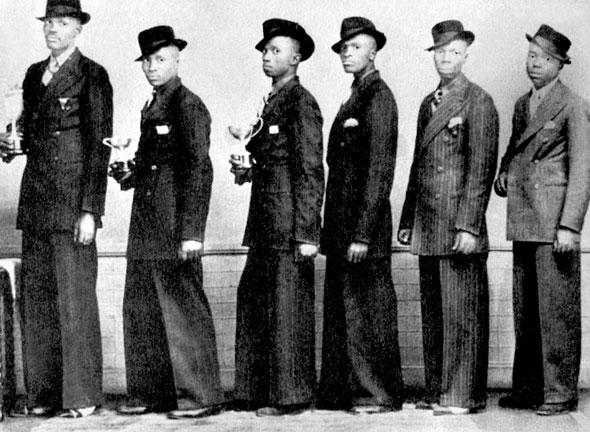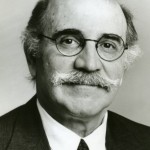The Lion Sleeps Tonight

Solomon Linda, far left, and the Evening Birds
Wimoweh.
For the last 50 years, that happy little word has been a universally recognized shorthand for the song known as “The Lion Sleeps Tonight.” From Pete Seeger’s version in 1952 (titled “Wimoweh”) to the Tokens’ No. 1 single in 1961 to its featured role in the hugely popular Disney film and Broadway musical The Lion King, the song has enchanted generations, sold millions of copies and passed into the world’s musical vernacular as a modern folk tune.
But the history of “The Lion Sleeps Tonight” is anything but happy.
Solomon Linda was born in the Zulu heartland of South Africa in 1909. He never learned to read or write, but he had a knack for songwriting. In his mid-20s, he moved to Johannesburg, where he led an a capella band that charmed audiences in the local beer halls. He sang in a high soprano over four-part harmony chants, a style that would come to define a whole generation of Zulu music. This sound was the basis for many of Linda’s songs, including his most famous, “Mbube.”
In Zulu, “Mbube” (EEM-boo-beh) means “lion.” During his childhood, Linda had worked as a herder protecting cattle in the African hinterlands. The main predator was the lion. The spartan lyrics of his song center on the phrase “mbube zimbe,” or “lion stop.” When Linda and his group, the Original Evening Birds, cut a 78-rpm recording of the song in 1939, it became the first African record to sell over 100,000 copies.
In the ‘40s, the song’s popularity spread through Europe. Though record companies in the U.S. weren’t interested, noted folk music historian Alan Lomax was. If not for Lomax, “Mbube” may have remained an African folk song. But he played it for his friend Pete Seeger. Delighted by the joyous call of what he heard as “Wimoweh,” Seeger worked up a version with his band the Weavers. Their 1952 record, with the Gordon Jenkins Orchestra, was basically them singing the title word with vocal flourishes over four simple chords. A Top 20 hit, the writing credit went to“Paul Campbell,” a pseudonym for the group. There was no mention of Solomon Linda.
Pete Seeger has recently said of the publishing situation, “I didn’t realize what was going on, and I regret it. I have always left money up to other people. I was kind of stupid.”
That same year, Linda had received 10 shillings—roughly 87 cents today—for signing over the copyright of “Mbube” to Gallo Studios, the company that produced his group’s original record. As compensation, they also gave him a job sweeping floors and serving tea in their packing house.
Meanwhile back in the states, the song became a popular staple for nightclub acts. The Weavers’ live version gave it another boost in 1957. Then in 1959, the Kingston Trio had a minor hit with it. Writing credits were listed as Campbell-Linda. In 1961, producers Hugo & Luigi hired Brill Building tunesmith George David Weiss to add lyrics to “Wimoweh” and it became “The Lion Sleeps Tonight,” a No. 1 hit for the Tokens. Within two years, there had been over 150 cover versions worldwide, in languages from Japanese to Finnish. Linda’s name had once again disappeared from the writers’ credits.
“Mbube” was now buried beneath two layers of pop arrangements—and two titles—but it was still Linda’s melody and concept. The royalties that he was supposed to be receiving on “Wimoweh” and “The Lion Sleeps Tonight” (paid by publisher the Richmond Organization) should have made him a rich man. But he got paid only on “Wimoweh,” and for that, less than 50 percent of what he was due.
It must have been much less, because in South Africa, Linda’s eight children survived on porridge and chicken feet (two died from malnutrition). And when Linda himself died in 1962, he had the equivalent of $22 in his bank account. His widow couldn’t even afford a gravestone for him.
The inequity went on for years, with Linda’s survivors never questioning the meager royalty checks they received (from 1991-2000, the years that The Lion King ruled on screen, VHS, DVD and stage, they got approximately $17,000). In 2000, South African journalist Rian Malan wrote an exposé for Rolling Stone, embarrassing several major players in the music publishing world and attracting lawyers to Linda’s family.
In 2002, director Francois Verster furthered the cause with A Lion’s Trail, a documentary tracing the long journey of “Mbube” to “The Lion Sleeps Tonight.”
Justice seemed to be a court case away. But it was no simple matter. Not only had Linda signed over the copyright to his song, but his wife and daughters had twice done the same in the years following. Ownership of “Mbube,” “Wimoweh” and “The Lion Sleeps Tonight” was a tangled mess. When lawyers finally sorted it out in February 2006, Linda’s survivors began receiving the compensation they deserve (the settlement applies to royalties dating back to 1987).
Sadly, there was one final injustice—in 2001, Linda’s daughter Adelaide died of AIDS at age 38, unable to afford a potentially life-saving anti-viral treatment.
When Solomon Linda wrote a song about lions preying on cattle, he could never have imagined the ultimate irony—that he was inviting a much more savage breed of predator into his own life.
—by Bill DeMain
From Performing Songwriter Issue 95
Category: Behind The Song







 Creative Workshops fill up quickly! Sign up here to receive first notice and announcements.
Creative Workshops fill up quickly! Sign up here to receive first notice and announcements. 





Solomon Linda was not able to read or write and according to The New York Times, did not know what he was signing for the 10 shilling payment.
For whatever it adds to the discussion, Pete Seeger never claimed to have written the song. Right from the beginning, he introduced the song in performance with the story of how he heard the song while visiting Africa.
And though he always gave props to Solomon Linda, he also described in detail the folk roots of the song, which predate Linda’s version.
(By Seeger’s telling, the “lion” represented the great king of the Zulus, Shaka Zulu. The references to the lion sleeping were a coded message that British rule would not defeat the Zulu people, who would one day wake up.)
The Weavers recorded many popularized versions of folk songs of indeterminate origin, which was why they created the pseudonym “Paul Campbell,” to hold those songwriter royalties. Had they not done so, most or all of those royalties would have gone into the pocket of their record company, Decca Records.
no one really “owns” anything
I think we all loved this song. It stuck in our heads & on our lip’s for a time !!!!!
Sorry, but Salomon Linda did not write this song. He improvised a traditional Zulu song sung when a king has passed away, as in “lion sleeps tonight.” Should not the royalties be distributed to all individuals who claim Zulu as their ethnicity? Should not the royalties of all recordings of “Greensleeves” not be given to all citizens of England as it obviously originated at some unknown time in that country? Or maybe Italy has rights to Greensleeves, as the tune is in a style foreign to England at the time, but common to Italy.
The words about a lion sleeping “in the jungle, the mighty jungle” were NOT from the original African song. Lions live in the savannah, not the rainforest. This aspect- cultural misunderstanding- was not addressed much in the article.
People here blaming Pete Seeger for any injustice have no idea what they’re talking about. Pete Seeger clearly was not, for good or bad, interested in the business side of music and that is evident from how he lived his life.
Seeger himself lost out on a small fortune by as he says “I didn’t realize what was going on, and I regret it. I have always left money up to other people.”
As early as the 1950s, when Linda’s authorship was made clear, Seeger sent him a donation of one thousand dollars and instructed TRO/Folkways to henceforth donate his (Seeger’s) share of authors’ earnings. The folksinger, however, who was not a businessman, trusted his publisher’s word of honor and neglected or was unable to see to it that these instructions were carried out.
Wonderful article – concise, yet still quite informative. Kudos to Ms. Hutchinson.
Some of these comments, however, seem a big misguided. One of theme even suggests that Pete Seeger let Solomon Linda sweep floors, as if he (or any of us) knew what was going on with the Linda copyright back then. Read the article, folks.
I think it’s prudent to remember that according to this article, Solomon Linda’s family signed over the rights to the song THREE different times…! (I don’t even fully understand how that happened, but that’s another story.) Anytime you give the rights to your song away to someone else, you reap what you sow. If there’s any real injustice, it would be that Solomon Linda was originally persuaded to do this, perhaps without fully understanding the possible missed opportunities that one might miss out on…? I really don’t know what Mr. Linda knew at the time. Of course, nobody knew in 1939 that the song would be so successful (and so many times, for so many different generations!), but as we see in this article, the music business was pretty unscrupulous even then. Writers have been coaxed into giving up their copyrights throughout the history of copyright.
I am not sure sure there is evidence (at least not in this article) that race had as much to do with it as some suggest. While many black writers have been separated from their copyrights by white publishers, managers, record labels, etc., in my opinion race doesn’t factor very much at all in this case. Some of this was indifference and ignorance (like on the part of Seeger, who loved this song, or Vanguard, the Weavers’ label, for not doing enough to track the writer down), some of it is greedy opportunism (on the part of Gallo Studios, who got Linda to give up his copyright).
The music business has always been like this. Here are a couple examples:
Anne Bredon, who wrote “Babe I’m Gonna Leave You”, which ended up on a Joan Baez live album with no writers’ credit, where Jimmy Page first heard it and recorded it later with Led Zeppelin, selling millions of copies on their debut album. (The story of this song is told in blog form elsewhere on the internet). Bredon was cheated out of a lot of royalties for many years, but race played no part of this – everyone here was the same race. Bredon’s credit simply fell through the cracks for years.
Another example – Berry Gordy “appropriated” a song by Bobby Parker called “You Got What It Takes” by putting his name, his sister’s name and a buddy’s name on it, leaving Parker’s name off of it entirely, in the top 10 recording by Marv Johnson in 1959, just as Motown was forming. Again, everyone here was the same race.
These examples illustrate the two main ways this seems to have happened in the Solomon Linda case – ignorance of the original copyright (or lack of follow through?), and plain ol’ opportunism, which really is about greed, and not really about race.
All in all, this was a wonderful article and great to read about the origins of this classic, historical song. While Solomon Linda apparently did sign his rights away, I do think it’s quite fitting that his descendants can now reap some of the benefits of its continued popularity. It is a shame that Solomon Linda died in poverty. That is horrible.
Lesson in this story for everyone who writes music – DON’T GIVE UP YOUR COPYRIGHTS!
Of course race has to do with it, Geoff. Anne Bredon is a terrible example. She never found out that Zeppelin had recorded her song because she didn’t listen to rock music. When a friend realized Zeppelin was doing the song without crediting her, she found out, took swift legal action, and made a very beneficial deal whereby she gets substantial money forever for doing nothing. Happy ending all around, because all the players (who were indeed the same race) also had the same access to the legal system, and made the same basic assumption that their opponents were human beings worthy of respect.
Solomon Linda did indeed sign his rights to the song away in exchange for a job sweeping floors. To say his decision had nothing to do with his race, in South Africa in the early 1950s, is naive. His situation: his children are starving. The white government will let them starve. The white people at Gallo know that he will take a crappy deal because he is poor and black and has no prospects. Linda knows the song has no reasonable chance of making him any money–since any money he was owed would inevitably have gone through white executives and lawyers who would have stolen it all. In short, he took a crappy deal that only looked good to him because he was a black man in Apartheid.
Totally agree with you. Another example is the Kenyan singer/songwriter of the famous song MALAIKA. In Swahili it means Angel. Mr Fadhili Williams died a poor man yet his song has been performed and re recorded world over, raking in $$$ for others including Mama Africa Miriam Makeba. If am not wrong, the family filed a complaint but am not sure if they got any compensation. Very sad.
This has been one of my core pieces of music for half a century. Until now, I had no idea of the backstory. The original recording of Solomon Linda’s and his group is extraordinarily beautiful. Thank you. But I don’t think there’s much point being hard on Seeger.
A very sad story indeed, there can be no excuses for the way this man and his family were treated by the music industry and influential musicians. The only saving graces are the facts that his music lives on and his heirs are finally receiving the money that Solomon deserved, no doubt it would please him to see his music remembered and his family reaping the fruits of his genius.
SHAME ON YOU PETE SEEGER
I am South African and live in Kwazulu Natal. My heart is broken for Solomon who died in poverty and greedy people got rich from his talents. Shame on his best friend Peter Seeger that stole his song and his life and took Solomons dignity from him by letting him serve tea and sweep floors for compensation. My own choir sang the song and it binds races together in harmony. Thank you Solomon Linda!
Sad that race had to play such a sad part in all of this. Poor guy didn’t even get a chance to benefit from the f fruits of his own labor. Greed rears its ugly head and good people get hurt. At least the generations of today can befefit. God bless Solomon Linda, what a timeless haunting soulful song, in any version.
A very lame excuse from Pete Seeger.
I’ve always loved this song, it’s very very catchy and I’ve no idea why he had so much trouble getting it published.
You have to recognize the fact that the song itself had gone through some notable changes from the time it was sung originally by Solomon Linda and his group The Evening Birds to when it became popular in the ’60’s. Mr. Linda is now considered a co-writer of this song and as such, his estate is a beneficiary to lucrative royalties that was not available to him when he was still alive. Is there some injustice done? You be the judge.!
The song was modified a bit by a soldier in Vietnam on Christmas Day of 1968 when one of the LP’s fell asleep.
“In February 2006, Abilene agreed to pay Mr. Linda’s family royalties from 1987 onward, ending the suit. No amount has been disclosed, but the family’s lawyers say their clients should be quite comfortable.” Excerpted from Sharon Lafraniere, “In the Jungle, the Unjust Jungle, a Small Victory, ” New York Times, March 22, 2006, p. A1.
Soloman must have been a very great man; it’s too bad he never had the opportunity to demonstrate his unusual talent.